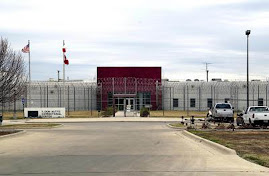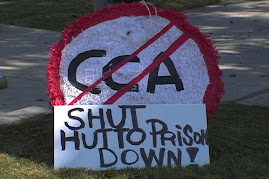Surviving Criminalization: Films on Incarceration & Family Detention The Equal Justice Society next month will feature two documentaries that take a probing look into America's criminal justice and immigrant detention systems. As racial justice advocates, we believe that building a movement that addresses both systems of oppression is imperative. Wednesday, October 14th
The film screenings will be followed by a panel discussion CLICK HERE TO BUY TICKETS For sponsorship inquiries, please contact either:
| ||||
Monday, September 28, 2009
Least of These Screening, San Francisco
Tuesday, September 22, 2009
**Last Families Leave Hutto**
The last immigrant families have departed a disparaged former Texas prison that housed them while they awaited decisions in their immigration cases, officials said on Friday.
The families have been deported, paroled or released while they pursue asylum or another immigration status to remain in the U.S., Immigration and Customs Enforcement said in a statement. Less than two dozen children and adults remained at the T. Don Hutto facility in Taylor last week and the last four families left by Thursday.
On Friday, her last day on the job, Ms. Schriro delivered a report on the detention system to Janet Napolitano, the homeland security secretary. We hope that it fully reflects the desperate reality: the brutal mistreatment; isolation, filth and deprivation; the shabby or nonexistent health care and the ill and injured detainees who languished and sometimes died, their suffering untreated.
Ms. Schriro’s successor will have a big job in fulfilling the administration’s promise of reform. The abuse and neglect must end. The system must also become much more discriminating about whom it holds — dangerous criminals, not the harmless and sick.
It will also have to rein in the private for-profit prisons that deliver brutal service on the cheap. And it will have to increase accountability and transparency. Ms. Napolitano can start by releasing Ms. Schriro’s report. Americans need to find out what happened in Basile, La., where detainees staged a hunger strike to protest detestable conditions, or downtown Los Angeles, where inmates filed a lawsuit to protest the squalor.
While Ms. Napolitano and her team promise to make detention a “truly civil” system, they show no interest in reforming the corrupt mechanisms that feed it. Instead, they are expanding the programs that have allowed corrupt local officials to round up thousands in unjust raids. The same people whom President Obama has promised a decent shot at citizenship remain easy prey to racial profiling, and are terrified of ending up in this truly uncivilized system. Mr. Obama and Ms. Napolitano must resolve that fundamental contradiction.
Thursday, September 10, 2009
AP: As detention center shuts down in Texas, advocates worry about future for immigrant families
As detention center shuts down in Texas, advocates worry about future for immigrant families
6:31 p.m. EDT, September 9, 2009
DALLAS (AP) — As immigrant children and their parents depart a disparaged former Texas prison that housed them while they awaited decisions in their immigration cases, advocates are questioning if the government has fully thought out what happens to the families now.
Federal officials announced last month that the T. Don Hutto facility in Taylor would no longer hold immigrant families and they instead would be detained at the much smaller Berks Family Residential Center in Leesport, Pa. But with only 84 beds — and more than 100 people once housed at Hutto — some advocates wonder if there will be enough space, or if immigrants will be released.
"We still have a lot of questions and would like to hear more details," said Denise Gilman, of the Immigration Clinic at the University of Texas School of Law, which along with other advocates filed a lawsuit contending that family detention at Hutto was inhumane.
Hutto is set to stop holding immigrant families by the end of the year, government officials say, and families have slowly been leaving. Instead of transferring the families to Berks, the government has been trying to process the cases of families at both facilities.
The Texas facility went from holding 127 men, women and children last month to just 22 people this week. They were either deported to their home countries or released while they pursue asylum or another immigration status to remain in the U.S.
As the change takes place, advocates are watching to see if thePennsylvania facility has better conditions, if cases are handled fairly and if new problems arise because of the shift.
Hutto opened as a family detention center in 2006, ending a so-called "catch and release" practice that had permitted families to remain free while their immigration cases were settled. The facility was necessary, ICE officials maintained, because many never showed up in court or some borrowed other people's children and posed as families to avoid detention.
But the facility quickly drew criticism, and The American Civil Liberties Union and other advocates sued the government in 2007 over the detention facility's conditions.
Attorneys and UT law students visiting Hutto to assist detainees with their immigration cases were astonished by the prison-like setting and regimen. Children wore drab prison scrubs. Razor wire encircled the site. They lived in tiny cells furnished with bunk beds and a steel toilet and were subjected to head counts several times a day. Guards with the for-profit Corrections Corporation of America trained to detain criminal adults were overseeing children. Parents said guards disciplined children with threats of being separated from their family.
The Berks facility, by contrast, is a former nursing home and with a reputation among attorneys for being more family friendly. Younger children stay with their parents, while teenagers sleep in separate rooms. One former resident told The Associated Press adults and children went on field trips during her stay, refrigerators in the hallways were stocked with fruit and juice and an interfaith prayer group is available. But still, the stays can be far from smooth.
The resident, who spoke on condition of anonymity because she fears for her safety after fleeing cartel violence in Mexico, said at the border, officials had told her and her American husband she would only be detained for a week at most. But when she arrived, there were families who had been at the facility for a year, longer than the typical stay of a month at Hutto. Some residents had waited for a month or two before being interviewed by an asylum officer.
"That's when I said to myself 'So what awaits me?'" said the Mexican woman, who has since been released on humanitarian parole after a month at Berks and has petitioned to remain in the country since she's married to a U.S. citizen.
Going forward, families arriving at the U.S. border and entry points seeking asylum or trying to immigrate will be taken to Berks if the government believes they will disappear instead of showing up to immigration court, said Dora Schriro, who has been heading up the new Office of Detention Policy and Planning at the Department of Homeland Security. Other families will be released and placed on some type of community supervision, Schriro said.
The families at Hutto will likely be deported or receive some type of immigration benefit, such as asylum or parole, allowing them to remain in the U.S. before Hutto closes, she said.
Schriro will leave her new post mending of the nation's immigration detention system to be commissioner of correction for New York City, leaving advocates with questions over how that will affect the upcoming changes.
For now, advocates for immigrant families say they will be watching to see if Berks detainees can access legal representation. About one-third of asylum seekers before the court that handles Berks' cases did not have an attorney, while a majority at Hutto did, according to the Transactional Records Access Clearinghouse at Syracuse University. Having an attorney boosts people's chances of remaining in the country.
They also worry there could be some unintended consequences in the switch, especially when it comes to distance. Berks is located thousands of miles from the border crossings in California, Arizona, New Mexico and Texas used by most of the detainees and some question whether the government will be able to quickly and humanely transport such families to Pennsylvania.
"What happens to a family arrested in Texas or who goes to the border ... and asks for asylum? Will those people be released?" asked Barbara Hines, director of the Immigration Clinic at UT Law School. "To send them all the way to Berks if they're going to be released anyway seems like a waste of resources to me."
Thursday, September 3, 2009
Williamson County Votes to End Contract with CCA
County ends contract with CCA
By Philip JankowskiWilliamson County Commissioners voted Tuesday to end their contract with Corrections Corporation of America, the contracted operator of the T. Don Hutto Residential Center for illegal immigrants.
County Judge Dan Gattis said the move was more of a “housekeeping” procedure than an indication the county no longer wishes to contract with CCA to operate the facility. Gattis said Monday the county is waiting for Immigrations Customs Enforcement to draft a new contract so the facility can continue to hold women.
In early August the Obama administration ordered children and families at the facility to be placed in a Pennsylvania facility deemed more suitable for children. Families were expected to be moved in a matter of weeks and to be fully removed within months.
The Taylor facility’s population of families had fallen in recent years. To help fill the 512-bed facility, ICE began housing female detainees at the facility. By mid 2008, an entire wing of the former medium security prison was devoted to housing women.
Without that contract in hand, Gattis said he felt a need to terminate the county’s contract with CCA just in case the ICE contract does not come through.
“To protect ourselves we’re giving notification to CCA,” Gattis said. “It’s one of those legal things we felt we needed to do because the funds come from the county.”CCA’s contract with Williamson County will expire at the end of this year. Gattis said he hopes to have a new contract with ICE before that, but if not, CCA will be forced to cease operations at the south Taylor facility.
“That’s a concern of mine,” Gattis said of the possibility of losing CCA jobs. “I hope (ICE) will come down with a proposal and we can keep that facility open.”
The T. Don Hutto facility is one of the largest and best paying employers of unskilled labor in Taylor. Guards can make upwards of $17 an hour, according to 2008’s contracted rates.
Gattis said he expects a certain amount of fervor to persist, though, in spite of children no longer being housed at T. Don Hutto, it will be greatly diminished.
“The majority of that group was upset because children were locked up, so that pressure will go away, but there’s a certain group that doesn’t believe in locking up people who are the in county illegally,” he said.










